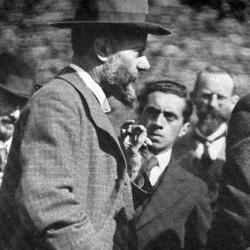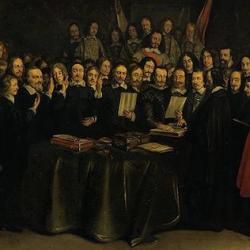Max Weber begins his lecture on “Science as a Vocation” by noting the “meaningless” of science, a product of the notion of scientific progress that guides scientific pursuits in the modern world. “Each of us knows,” Weber writes, “that what he has accomplished will be antiquated in ten, twenty, fifty years. That is the fate to which science is subjected; it is the very meaning of scientific work, to which it is devoted in a quite specific sense, as compared with other spheres of culture for which in general the same holds. Every scientific ‘fulfilment’ raises new ‘questions’; it asks to be ‘surpassed’ and outdated. Whoever wishes to serve science has to resign himself to this fact. Scientific works certainly can last as ‘gratifications’ because of their artistic quality, or they may remain important as a means of training.” This is the whole aim of science, the “common goal”: “We cannot work without hoping that others will advance further than we have,” and “this progress goes on ad infinitum” (using the translation in Stephen Karlberg, Max Weber: Readings and Commentary on Modernity, 321).
This raises the question of the meaning of science. What can science mean if it is never completed, if we are engaged in a project that is by definition never finished? Why continue to pursue science under these conditions? He thinks the answer is insoluble. Science doesn’t lend itself to answering questions of meaning.
Scientific progress, he goes on to argue, is an aspect of the “process of intellectualization” that has been going on for millennia (322). Practically, this doesn’t mean that we have greater knowledge than our ancestors. “The savage” has far more knowledge of the way his world works than we do; he is far more attuned to his tools. We don’t understand most of the technologies we use, but trust that these technologies will work even when we can’t understand them.
What distinguishes the intellectualization of modernity from the pre-modern knowledge is modern person’s belief that he has the potential to learn and understand how things work. We operate with “the knowledge or belief that if one but wished one could learn it at any time.” And this implies that “principally there are no mysterious incalculable powers that come into play, but rather that one can, in principle, master all things by calculation.” And that in turn implies that we regard the world as “disenchanted”: “One need no longer have recourse to magical means in order to master or implore the spirits, as did the savage, for whom such mysterious powers existed. Technical means and calculations perform the service. This above all is what intellectualization means” (322). Weber’s point has less to do with the belief that we have explained everything. Disenchantment does not amount to proof that magical means and mysterious incalculable powers are fictitious. It is more in the attitude of the modern person, who does not think the world explained but is confident that the world is explainable.
Disenchantment has existential as well as technical/scientific import, and Weber argues that no one captured this existential effect so well as Tolstoy. “All his broodings increasingly revolved around the problem of whether or not death is a meaningful phenomenon. And his answer was: for civilized man death has no meaning.” Scientific progress robs death of meaning: “the individual life of civilized man, placed into an infinite ‘progress,’ according to its own imminent meaning should never come to an end; for there is always a further step ahead of one who stands in the march of progress. And no man who comes to die stands upon the peak which lies in infinity.” Death in the premodern world possessed the sense of closure at the edge of eternity: “Abraham, or some peasant of the past, died ‘old and satiated with life’ because he stood in the organic cycle of life; because his life, in terms of its meaning and on the eve of his days, had given to him what life had to offer; because for him there remained no puzzles he might wish to solve; and therefore he could have had ‘enough’ of life.” By contrast, “civilized man, placed in the midst of the continuous enrichment of culture by ideas, know- ledge, and problems, may become ‘tired of life’ but not ‘satiated with life.’ He catches only the most minute part of what the life of the mind brings forth ever anew, and what he seizes is always something provisional and not definitive, and therefore death for him is a meaningless occurrence. And because death is meaningless, civilized life as such is meaningless; by its very ‘progressiveness’ it gives death the imprint of meaninglessness” (322-3).
Again, the argument is not a metaphysical one. It is not that scientific progress has proven that the world is nothing but matter in motion, without aim or purpose. The argument is that progress has opened an infinite future that an individual can never come close to reaching. Abraham died at the edge of eternity; scientific progress has pushed eternity out far beyond the life of any individual, and so death no longer has a sense of an ending.
Weber traces a genealogy from the Platonic discovery of the concept through the Renaissance prioritization of the experiment to an age where science is no longer thought to be the path to meaning. During the Renaissance, “to artistic experimenters of the type of Leonardo and the musical innovators, science meant the path to true art, and that meant for them the path to true nature. Art was to be raised to the rank of a science, and this meant at the same time and above all to raise the artist to the rank of the doctor, socially and with reference to the meaning of his life. This is the ambition on which, for instance, Leonardo’s sketch book was based.” In Weber’s day, young people wanted to be delivered from science in order to rediscover their nature and nature. Science was no longer considered a pathway to art (324-5).
That is a recent development. In the early age of scientific progress, scientists weren’t content to discover nature or art but aspired to use science to point the way to God: “If you recall [the eighteenth-century German anatomist] Swammerdam’s statement, ‘Here I bring you the proof of God’s providence in the anatomy of a louse,’ you will see what the scientific worker, influenced (indirectly) by Protestantism and Puritanism, conceived to be his task: to show the path to God.” Protestants had given up the medieval faith in philosophy as a handmaid to theology, “in the exact sciences . . . where one could physically grasp His works, one hoped to come upon the traces of what He planned for the world.” This perspective had disappeared by Weber’s time, and with the evaporation of this theological goal for science the goal of pursuing meaning evaporated too: “Who – aside from certain big children who are indeed found in the natural sciences – still believes that the findings of astronomy, biology, physics, or chemistry could teach us anything about the meaning of the world? If there is any such ‘meaning,’ along what road could one come upon its tracks? If these natural sciences lead to anything in this way, they are apt to make the belief that there is such a thing as the ‘meaning’ of the universe die out at its very roots” (325).
Instead of seeking God through science, the nineteenth century abandoned not only science but reason to find God: “That science today is irreligious no one will doubt in his innermost being, even if he will not admit it to himself. Redemption from the rationalism and intellectualism of science is the fundamental presupposition of living in union with the divine. This, or something similar in meaning, is one of the fundamental watchwords one hears among German youth, whose feelings are attuned to religion or who crave religious experiences. They crave not only religious experience but experience as such” (325).
For Weber, this is all a matter of defining “science as a vocation.” The point is not that the big questions of meaning are irrelevant or pointless. His argument is simply that science is not designed to answer such questions, and given modern presuppositions about scientific progress and the capacity of science to explain the world, such a conclusion is virtually inevitable. Science’s aims must be much more modest.















